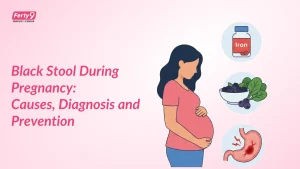Having children is generally one of the most satisfying moments in people’s lives. However, there can be hurdles to becoming pregnant, one of which is weight. Being overweight, obese, or underweight can all have an impact on a woman’s reproductive health. This suggests that the chances of getting pregnant may be more challenging. Reducing your BMI before becoming pregnant, even by one or two points, will help lower your chance of pregnancy complications. For those who suffer from obesity, weight loss can have major effects on their fertility and pregnancy health.
Ideal Weight for Conception Varies
The recommended weight for conception d epends on your height. Your body mass index (BMI) is a value calculated by;
Using your weight in kilograms and the height in centimeters, the BMI formula is:
For example, if you weigh 70 kg and are 170 cm tall:
The healthy BMI range is 19–25. Adults with a BMI of 25 to 29 are considered overweight, whereas a BMI greater than 30 implies obesity. Obesity makes it more difficult to conceive and increases the risk of pregnancy issues for both the mother and the baby. If your BMI is less than 19, conceiving may be more difficult.
You can use the BMI calculator to determine your BMI. Losing weight before conceiving is the best approach to safeguarding both your health and the health of your unborn child.
Impact of Being Overweight on Fertility
Unhealthy weight can impact a woman’s ability to conceive by:
- Menstruation abnormalities,
- Hormonal imbalances, and
- Issues with ovulation
A man’s fertility may also be lowered by extreme obesity or overweight. This is probably caused by a number of factors, such as:
- Hormone issues,
- Erection issues, and
- Other illnesses associated with obesity
The primary cause of infertility in obese individuals is a hormonal imbalance. Adipose tissue, commonly referred to as body fat, is in excess and raises estrogen levels, which interferes with the ovaries’ ability to produce healthy eggs.
Additionally, it may result in issues with assisted reproduction techniques such as intracytoplasmic sperm injection (ICSI), ovulation induction, and in-vitro fertilization (IVF). Polycystic ovarian syndrome (PCOS), a major cause of infertility or lower fertility, is also linked to obesity.
Pregnancy issues such as miscarriage, high blood pressure, preeclampsia, gestational diabetes, cesarean section, and stillbirth are also associated with obesity and excess weight during pregnancy. Losing weight does more than simply balance your hormones in preparation for pregnancy. It also decreases your blood pressure and blood sugar, which can benefit your baby’s health.
Following a fertility diet and achieving weight loss can enhance reproductive health and boost chances of getting pregnant.
Impact of Being Underweight on Fertility
If you are underweight (BMI 19), you may have difficulty becoming pregnant. Being underweight may lead your body to stop producing estrogen. This can result in irregular menstrual cycles and delay the chances of getting pregnant . You might stop ovulating and having a period. This is particularly true if you are losing weight because you are not eating enough or exercising excessively, which could indicate an eating disorder such as anorexia nervosa. Underweight women are more likely to wait more than a year to become pregnant than women in the healthy weight range.
Women with low BMIs should consult their doctors and other healthcare specialists to determine the cause and find measures to improve their condition.
How Losing Weight Can Improve Fertility?
Your possibilities of becoming pregnant and giving birth to a healthy child increase if you begin a good diet and exercise regimen. Starting a path to a healthier weight by improving your daily physical activity and making good dietary modifications. You can increase your fertility by lowering your insulin resistance, lowering your blood sugar, and reestablishing hormonal balance through weight loss. Obesity raises the risk of miscarriage and lowers the rate of pregnancy and live births in women on ART. However, these results are greatly enhanced by weight loss achieved through dietary lifestyle modifications.
Losing weight can significantly improve fertility by
- Balances hormones
- Restores Ovulation
- Enhances IVF Success
- Reduces Insulin Resistance
- Reduces Pregnancy Complications
For men who are obese or overweight, losing weight might increase the quantity and quality of their sperm. The chance of getting pregnant can be increased by achieving a healthier weight at least three months before conception. This is because sperm evolve over the course of three months, and maintaining a healthy weight throughout this time promotes the development of healthy sperm.
Tips for a Healthier Weight Before Pregnancy
Maintaining a healthy weight before pregnancy helps boost fertility, increases the chance of getting pregnant , prevents challenges, and promotes a better pregnancy.
Here are some beneficial strategies for reaching a healthier weight before conception:
- Follow a healthy, balanced diet
- Cut back on unhealthy foods
- Replace alcohol and sugary drinks with water
- Fit in regular physical activity
- Focus on relaxation techniques
- Healthy sleep pattern
- Managing stress
- Monitor and Regulate Hormones
- Take Prenatal supplements
Even a small weight loss might have a big impact on infertile individuals.
Conclusion
Losing weight can boost fertility by restoring hormonal balance, controlling ovulation, and improving sperm quality. Even a small weight loss can increase the chances of pregnancy, particularly for those with problems like PCOS and insulin resistance. Maintaining a healthy weight helps to decrease pregnancy difficulties, making the journey safer for both mother and baby. Sustainable weight loss requires a well-balanced diet, frequent exercise, and stress management. Prioritizing a healthy lifestyle before pregnancy can significantly improve the chances of successful conception and a healthy pregnancy.




























